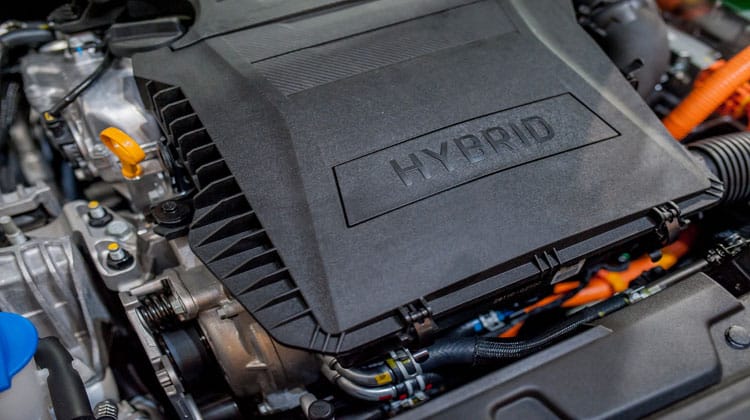THIS POST MAY CONTAIN AFFILIATE LINKS. PLEASE SEE MY DISCLOSURES. FOR MORE INFORMATION.
Many people are becoming eco-conscious and are choosing to live a life that has little impact to the environment.
One big area of popularity is hybrid cars.
By using less gas and having fewer emissions, many people think these types of vehicles are a smart way to help protect the environment.
But many people don’t look at the whole picture.
They only look at the end result, like less fossil fuels to run the hybrid vehicles and lower emissions.
The truth is, to understand if hybrids are good for the environment, you need to look at the entire picture.
And this is what this post will do.
By the end, you can decide how much better for the environment hybrid vehicles are compared to a gas powered vehicle.
Table of Contents
Are Hybrids Good For the Environment?
Different Types Of Hybrid Vehicles

Before we dive into this topic, it is important to understand the different types of alternative fuel vehicles on the road today.
This is because the environmental impact is a little different for each.
- Hybrid: A traditional hybrid car uses both an electric motor and a gas engine to power the car. It has a battery pack that powers the electric motor. The battery is charged through a regenerative braking system and kinetic energy.
- Plug-In Hybrid: Plug-in hybrids, also called a PHEVs, still use both an electric motor and a gas engine. It has a charging port that allows you to charge its larger battery. It also takes advantage of regenerative braking as well. This larger battery allows the vehicle to have a longer electric range than a traditional hybrid.
- Electric Vehicle: This vehicle only has an electric motor. It uses a charging port to recharge the battery pack. Since they only run on battery power, you are limited with how far you can drive until you need to recharge.
- Conventional Cars: This is your traditional gas car that is powered only by a gasoline engine.
- Diesel Cars: A diesel car is similar to a conventional car in that it uses an internal combustion engine to run. Instead of gasoline however, it uses diesel fuel for power.
Hybrid Batteries
The biggest con of hybrid cars and the environment is the battery.
These batteries are made of lithium ion. Older hybrids used nickel-hydride batteries.
In either case, these are rare earth metals that need to be mined out of the ground.
To mine them, bulldozers and other heavy equipment is used.
This heavy machinery is powered by fossil fuels that emit carbon dioxide into the atmosphere, which isn’t good for the environment.
As bad as this is, the story gets worse.
Once the rare earth metals are mined, they need to be refined.
The battery manufacturing factories that refine them are also powered by fossil fuels and emit carbon dioxide into the air.
And to refine these metals, harmful chemicals are used and many times, they leak into the local water system, contaminating it.
Battery Disposal

What about the impact of batteries that reach their end of life?
For a traditional car, these batteries are recycled and used in other manufacturing processes.
An electric battery is also recyclable and in many ways, is more useful.
This is because a typical electric battery that is no longer powerful enough for hybrid electric vehicles still has close to 80% life left in it.
As a result, it can power many other things.
In fact, some power utilities are looking into repurposing these batteries for use in helping create green energy sources.
Hybrid Vehicle Production
You would think that producing cars is the same, regardless if it is hybrid vehicle or a gasoline powered car.
But the reality is a hybrid car produces far more greenhouse gases, at least in the case of the Toyota Prius.
Toyota admits that the Prius is more carbon dioxide heavy compared to their non-hybrid cars.
Driving A Conventional And Hybrid Car

Since a traditional hybrid vehicle has a gas engine, it also produces greenhouse gases and carbon dioxide.
However, because of its improved fuel consumption, it produces a smaller carbon footprint than a typical car.
Also, you have to look at how fuel efficient electric vehicles and plug in hybrids are.
By offering better fuel economy, they decrease the need for gasoline or diesel fuel.
But in many cases, they are most efficient with city driving and not highway driving.
This is because at lower speeds and stop and go driving, the electric motors work more than the gas engine does.
At higher speeds and the need for additional power on the highway, the electric power motor can’t keep up.
Fuel Sources
Another area to look into is the fuel source for these vehicles.
While a typical car uses gasoline to power it, plug in hybrids and electric vehicles use electricity to charge their battery.
The source of the electricity needs to be known.
Is it from a traditional fossil fuel like coal, power plants, or natural gas?
Or is it from wind power, solar energy or other renewable electricity sources?
Depending on the source, it can have an impact on the carbon emissions.
The Bottom Line
So when you take into account the carbon footprint of battery production pollution, the fuel source of electric vehicles and plug-in hybrid cars, and the overall production of the vehicle, does this offset the higher CO2 emissions produced by a gas powered car?
The answer is, it looks like it.
I know you want a definitive answer, but there are a lot of studies out there and many comes to different conclusions.
For the most part, the studies in favor of electric cars overstate the limited impact they have versus a comparable fossil fuel vehicle.
When you correct for this, the benefit is not as great as one would think.
My belief is that these are biased to the results in one way or another.
For example, a study that was funded by an environmental company might want to overstate the benefits of fully electric vehicles.
On the other hand, a study funded by oil companies might want to understate the benefits.
Take this study as an example.
Its analysis shows that plug-in hybrid vehicles emit far more greenhouse emissions than reported.
The original study said that a plug in hybrid emitted 44g of carbon dioxide per 100 kilometers.
But this study says that that number is closer to 117g of carbon dioxide per 100 kilometers and that overall, plug in hybrids are worse than a comparable fossil fuel vehicle.
Which one are you to believe?
The truth most likely lies somewhere in the middle.
Hybrids and electric cars are better for the environment compared to conventional cars, but not as good as many studies claim.
Final Thoughts
At the end of the day, the question of are hybrids good for the environment has to be looked at in greater detail than just the lifetime emissions.
While hybrid cars and electric cars offer far greater fuel efficiency compared to a conventional vehicle, you have to take into account the production and manufacturing of the batteries.
In the end, my guess is electric cars are much better for the environment than a conventional vehicle and a hybrid car is a little better than a traditional car.
- Read now: Here is how to save $500 a year on car insurance
- Read now: Find out the best way to negotiate car prices
- Read new: Discover how to save money for a car fast
- Read now: Learn the best gas hacks you need to try
I have over 15 years experience in the financial services industry and 20 years investing in the stock market. I have both my undergrad and graduate degrees in Finance, and am FINRA Series 65 licensed and have a Certificate in Financial Planning.
Visit my About Me page to learn more about me and why I am your trusted personal finance expert.
